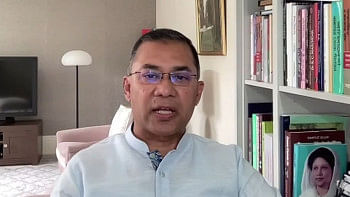Malaysia to take workers thru' private channel
After the government to government (G2G) system failed to live up to the Bangladeshi migrant workers' expectation, Malaysia under a new mechanism has agreed to recruit 500,000 workers from Bangladesh in the next six months of the current year, the expatriates' welfare and overseas employment ministry yesterday said.
The agreement, called Business-to-Business (B-B) mechanism, was reached between Malaysian Home Minister Dato' Seri Dr Ahmad Zahid Hamidi and Expatriates Welfare Minister Khandker Mosharraf Hossain at a bilateral meeting in the Malaysian city of Putrajaya yesterday, the ministry said in a press release.
Contacted, Kazi Abul Kalam, joint secretary of the ministry, told The Daily Star that the recruitment would be operated through private recruiting agencies of the two countries under the new agreement.
"Under this new mechanism manpower recruitment can be run through private recruitment agencies," he mentioned.
The expatriates welfare minister is now visiting Malaysia to review the recruitment process under the G2G system which has fallen short of sending as many workers to Malaysia as it had promised.
According to the press release, the Malaysian home minister said the legal workers are welcome in Malaysia and the application for employment will be received online, which will be monitored by the agencies of the Malaysian government. He also said each worker will be recruited for a term of three years with provisions for extension by another year.
Expressing concern about the slow pace of recruitment under the G2G, Mosharraf said the new mechanism has to be carefully examined. He invited a high level team from Malaysia to work on the modus operandi of the proposed mechanism, the release said.
According to the release, a Malaysian delegation will soon visit Bangladesh in this regard and after the visit of the Malaysian team, an agreement on B-B mechanism will be examined by the technical committees of both the governments.
In the release Mosharraf underscored the importance of manpower export under an arrangement that does not exploit applicants and do not charge them unreasonable fees. He also said the welfare and security of the workers has to be guaranteed by the employers.
However, there are doubts about how far the new agreement will be implemented as the G2G system has not succeeded.
When Malaysia withdrew a four-year embargo on the recruitment of Bangladeshi workers, a memorandum of understanding was signed for the G2G between Malaysia and Bangladesh in November 2012. Expatriate Welfare Minister Khandker Mosharraf Hossain had then told the media that at least 50,000 Bangladeshis would be sent to Malaysia within a year and one lakh by the next year gradually.
However, only 7,000 Bangladeshis have been sent to Malaysia so far since April 2013 under the G2G system.
Targeting the Malaysian jobs, the ministry directed the Bureau of Manpower Employment and Training (BMET) to prepare an online database of the interested jobseekers.
More than 1.4 million Bangladeshis registered their names online from across the country by February with great enthusiasm to go to Malaysia. But the government failed to arrange jobs for them.
The Malaysian government is also responsible for the failure of the G2G system as it didn't open all sectors except plantation.
As a result, thousands of Bangladeshis were taking illegal channels to reach the Southeast Asian country by sea and air. Over one lakh Bangladeshis were reportedly victims of cheating by manpower touts and human traffickers in the last two years.

 For all latest news, follow The Daily Star's Google News channel.
For all latest news, follow The Daily Star's Google News channel. 



Comments